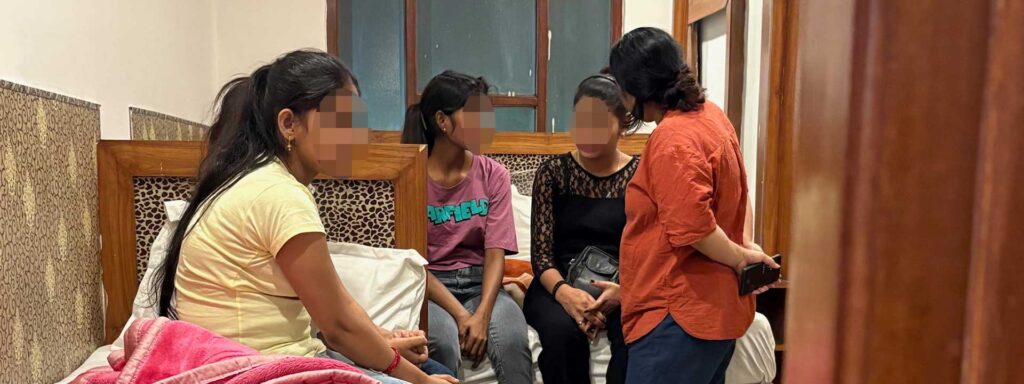In the neon haze of a bustling Paharganj night, under the veneer of Delhi’s vibrant market lights, a heartbreaking truth lay hidden—one that speaks of stolen freedom, broken innocence, and the quiet, relentless courage of those who fight in the shadows.
It was a night like any other in March. The streets buzzed with life, the shops sparkled under the LED light, and the crowds moved unaware of something happening that was about to break. At the heart of this operation stood two determined teams led by the Central Delhi Police, acting on a tip that hinted at something far more sinister than the humdrum of a crowded city night. The operation was led by Sub-Inspector Kiran Sethi, in charge of the Swami Sharada Nand Marg All Women Police Post.
At around 10 PM, as most of the city reveled in the illusion of safety, the two teams split—one headed toward a house believed to be holding young girls, and the other toward a hotel where their dignity was being auctioned. I led the team to the house.
What unfolded before my eyes wasn’t just a police operation—it was a raw, visceral experience that exposed a human tragedy too painful to ignore. Below the targeted house, a line of scooty riders stood like foot soldiers, ferrying girls to waiting rooms of horror disguised as hotel suites. It looked eerily familiar—almost like a food delivery hub. Except, the “orders” weren’t meals. They were lives. Daughters. Sisters. Souls.
Two girls stepped out of the house, their movements mechanical, their eyes devoid of dreams. They walked a few steps and climbed onto a scooty. The other team, waiting at the drop-off location, was ready. The handoff was seamless—like a transaction. A system. A machine that had replaced humanity with commerce.
It was a moment of clarity—of helpless fury. Because just days earlier, we had celebrated Women’s Day. We had posted messages, gifted flowers, and given speeches. And here we were, rescuing 22 young girls from a warehouse-like brothel, reduced to commodities in a business that should never have existed.
Some say these girls choose this life. But how can we, as a society, be so blind? What choice lies in deceit? What freedom is there when poverty, manipulation, or violence becomes the gateway to prostitution?
These are not “working women.” They are the exploited, the silenced, the forgotten. And perhaps the most haunting realization is this: if we had more officers, more hands, more time—those 22 girls could have become 40, or even 80.
In this era where everything has become digital—even this dark trade—it’s easier to exploit, harder to trace, and infinitely more dangerous. The predators have evolved. Have we?
We must talk. Not in hushed tones or only behind closed doors—but openly, relentlessly, with our children, our neighbors, our colleagues. Because silence feeds the system. And awareness shatters it.
This isn’t just about a rescue operation. It’s a reminder that while the lights of Paharganj glitter each night, there are still corners cloaked in unspoken pain. And it is our collective voice, our collective outrage, and our collective action that can one day bring those girls home—for good.
